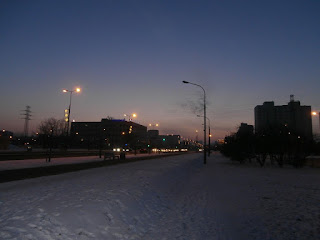If every time you touch heaven you find out there's nothing to grab and you fall back to earth, if every time you plunge into hell you find out instead of drowning in the abyss you bounce back and return to earth, it probably signifies a human's place is on earth.
I owe big
thanks to my Guardian Angel who kept me company over the whole year and has not
let me run into troubles though opportunities were ample. This was a year when
for the first time since roughly setting up this blog I was touching heaven and
then, to strike the balance, I was sending myself to the darkest depths of
hell. Needless to say such trips are dicey as both when you fly too close to
the sun and when you are licked by infernal flames you risk being burnt.
Therefore I thank my Angel for not letting me kiss the sun and for lifting me
up from caverns of hell.
The Angel
is a metaphor, albeit last year’s ups and downs have made me believe in the
existence of a supernatural creature that keeps tabs on every man. Now the
mystery to be unravelled is the extent to which Guardian Angels interfere in
humans’ fates. If you look at the magnitude of miseries which afflict
representatives of mankind every day, no wonder you seriously doubt in the
powers of shields Angels use to protect people. I discern it and thank once
again, as I was lucky to have been looked after by a very patient and wise
Guardian Angel and to have got off lightly from situations when my common sense
was turned off.
How much
joy your life gives you is roughly equal to optimism towards life you display.
There is always the option to focus on the dark, yet indispensable, side of
life. In November a stupid song made me realise some feelings are natural and sometimes not feeling pain would be a reason to worry. “Where there is a flame,
someone’s bound to get burnt” – if so, burning at some stage of that affection
was inevitable. When making a summary of 2012 I could highlight the bitter experiences; there were some, probably more than in previous years, but they
happened because I felt much more than in previous years. For sake of waking up
from a long-lasting spiritual numbness I deem 2012 to have been a particularly
great year. Not everything turned out the way I had wanted, but every time when
confronted with adversities, I emerged stronger and never lost heart. Sometimes
to cope better with emotions I did turn on the ‘numb’ mode, but these were
always temporary moves aimed at relieving psyche.
Maybe this
is the way how we should handle life. Every time bad fate slaps your face,
instead of hitting it back, give it a kiss. For those of you who have lived
through some sort of severe suffering, this may sound ridiculous, but try to
treat every hardship, every calamity, every blow as a chance, and as a lesson.
The worst you can do is letting the pain knock you down. Such stance means
letting bad luck or bad people triumph. How about spiting them? Whenever
adversity hits you, put a smile on your face.
Some two
weeks ago I left my car for the whole day in the open air, exposed to freezing
snow and rain and in the evening I found my vehicle covered by a layer of ice
and frozen snow. Try opening any door in such conditions… I beheld it and burst
out laughing. After all I was facing a challenge!
Disasters
strike you when you don’t take precautions to avert them. In early December I
had sprayed door seals with silicon and packed a hammer and screwdriver into my
briefcase. Armed in these tools I broke the ice with a smile on my face, which
brought back to life central locking system and allowed me to open the door
without problems. The engine, despite dampness which could have played havoc
with electrics and motor starter, cranked up without a murmur, then it was all
downhill. Seemingly a small trouble, but depending on your attitude and how
prudent you are, it can knock you down or toughen you up.
As this
year ends I think I’m richer as I’ve learnt to look adversities in their eyes.
Never turn your eyes away, when your enemy sizes you up. Look at the bright
side of life, there’s always such one, but it sometimes takes some effort to
discern it. May the new year bring all of you many cheerful days, may troubles
stay away from you, may your Guardian Angels be as merciful for you in 2013 as
mine was for me in 2012. And don’t be afraid of changes in your life. Any
change, although it involves taking risks, should be treated as a chance for a better
life. And remember, it could always get worse...
Technical
announcements:
1.
Apologies for lack of posting a week ago. I was down with flu and decided to
stay in bed to overcome the illness once and for good, unlike other people who
get up, go to work and spread germs (we have an epidemic of flu in Poland). The
strategy proved successful!
2. Next
week – road construction summary – let’s look what roads were opened in Poland
in 2012
3. Any
hints on the direction in which the blog should drift – for aforementioned
reasons posts on economy of politics have become infrequent here, while I began
to focus on myself and turned the blog into a form of personal diary for posterity,
against my intent at inception of blogging…








